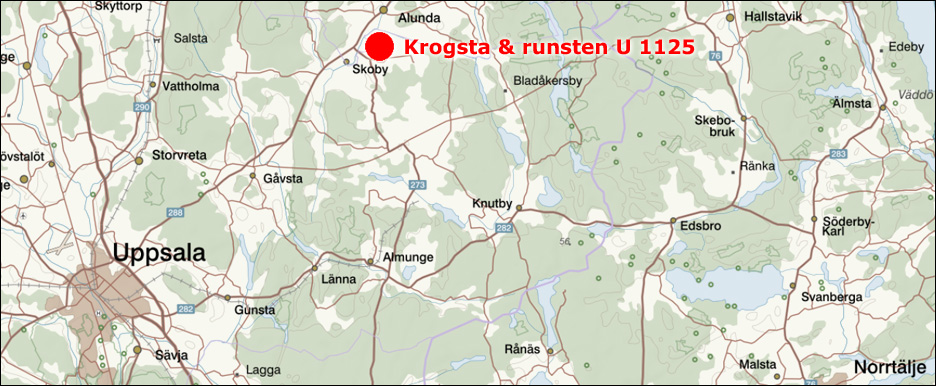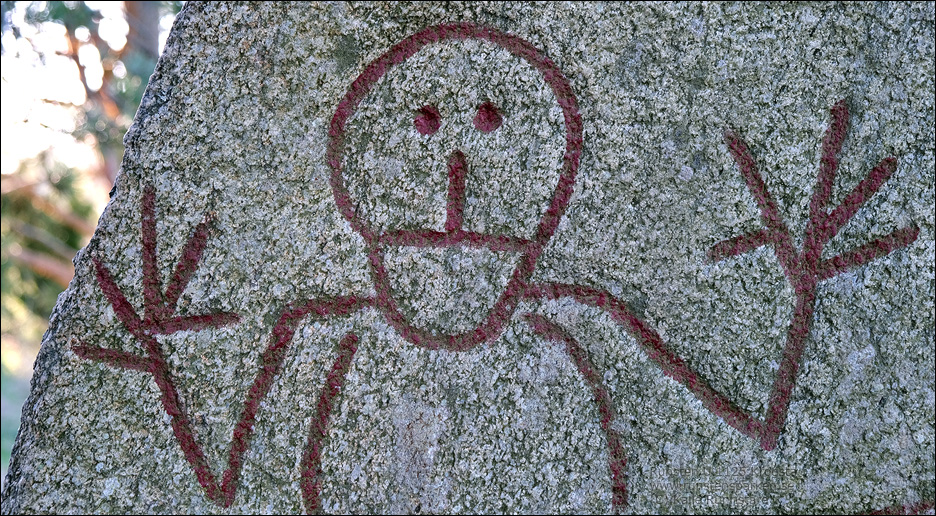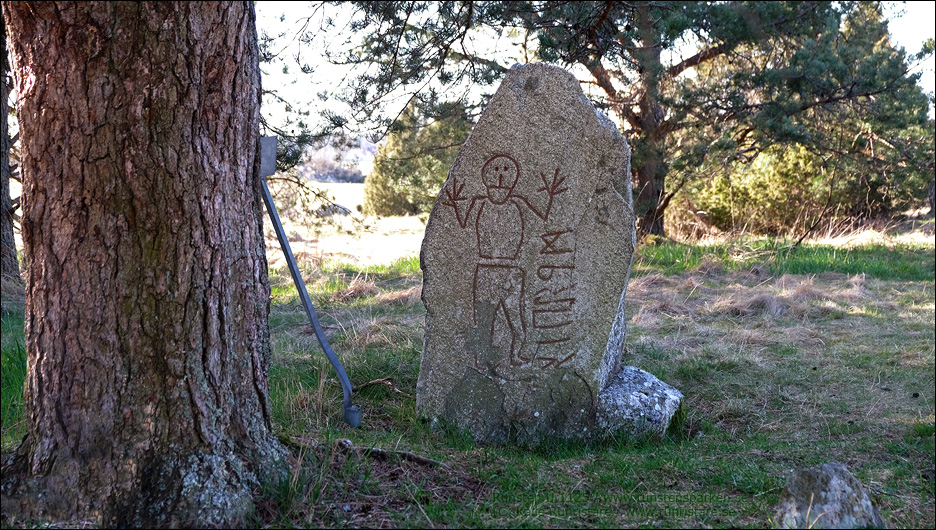
Runic inscription
Front:
m w s ï e i j -
Back:
s ï a i n a z
The runes should be read
from right to left.
When the stone was erected in the Krogsta burial ground
1,500 years ago, the older rune line of Old Norse runes was
used.

The runes are so difficult to
interpret that on the website "Runes"
they have chosen to believe that they are chiffer or code
runes on the front. On the back, it is somewhat easier to
interpret the runes and it probably says "stone".
The runestone, which is from
the 6th century, is among Uppland's oldest and it stands in
its original place.
Ever since the 16th century,
the rune stone has been a favorite among researchers, and in
Uppland runic inscriptions, no less than 34 pages are
devoted to the rune stone. (Only in Swedish)
(See links below).
History
The Krogsta runestone stands
in its original place in a burial field in Krogsta 30 km NE
of Old Uppsala.

In the burial ground there
are about 25 round graves built of stones and covered with
earth and peat, height only 10 to 50 cm. In the burial
ground there are also rows of stones and a terrace.
Ornamentation/motif
At first meeting, the old man
looks like a simple child's drawing. At the second and third
meeting, the motive grows and you easily become good friends
with the old man in Krogsta.
If granite is difficult and
hard to process during the Viking Age and even today, it was
several times more difficult in the 6th century. Hardening a
chisel to exact hardness is difficult and the question is
whether the stone was cut directly with a sledgehammer or an
even harder type of stone? The cutting grooves are wide and
shallow.

The risk that pointy ends of
chopping grooves that meet may break has been avoided here
by precisely avoiding sharp parts, the placement of the
fingers is a good example.
I'm thinking a bit...
The runestone is so old,
several hundred years before the Viking Age, so it is very
difficult to interpret both the runic inscription and the
function of the rune stone.
My first encounter with
the runestone.
I had known about the runestone for a long time, read about
it and seen it in pictures, but when I came over the hill of
the burial field and met the old man in Krogsta face to
face, it was really like meeting an old friend.
It's like he was looking at
me through a 1500 year old time window, from his time to my
time and me back.

I felt welcomed and greeted back with a
cheerful -Hello!
I think the old man in Krogsta is there as a guard and to
meet visitors to the burial ground. I think he wants to say
that we are welcome as long as we are humble and show
respect for both the place and the ancestors who are there.
Visit the runestone?
There is no designated
entrance or sign to the runestone. You park where you can by
the roadside and step over electric fences, the old man in
Krogsta and the burial ground is inside a paddock.

The back of the runestone
Links:
Upplands runinskrifter >
page
477-510
Lots of good information but only Swedish.
Runor > - Riksantikvarieämbetet
Map and runic inscription.
Google map >
Find the runestone
kalle@runristare.se
If you want to be of help or have a question.
Extra Runestones:
Ärnfast, his artwork outside Ekerö municipality
U
79 - Hässelby, by Ärnfast
U 123 -
Karlberg, by Ärnfast
U 885
- Balingsta, by Ärnfast
Selected runestones that are also
depicted in the Runestone park
(Runstensparken)
Sö 141b - Aspa
bridge with Svitjod
Sö 179 -
Gripsholm, an Ingvar runestone
U 887
- Skillsta, one of the most beautiful
Vs 29
- Livsten's masterpiece at Sala
|

